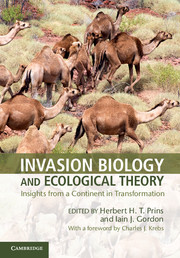Crossref Citations
This Book has been
cited by the following publications. This list is generated based on data provided by Crossref.
Vance, Eric
Loehle, Craig
Wigley, T.
and
Weatherford, Philip
2014.
Scientific Basis for Sustainable Management of Eucalyptus and Populus as Short-Rotation Woody Crops in the U.S..
Forests,
Vol. 5,
Issue. 5,
p.
901.
Shang, X.
Yao, Y.
Huai, W.
and
Zhao, W.
2015.
Population genetic differentiation of the black locust gall midgeObolodiplosis robiniae(Haldeman) (Diptera: Cecidomyiidae): a North American pest invading Asia.
Bulletin of Entomological Research,
Vol. 105,
Issue. 6,
p.
736.
Yao, Yanxia
Zhao, Wenxia
and
Shang, Xingpu
2015.
Development of Polymorphic Microsatellite Markers ofObolodiplosis robiniae(Haldeman) (Diptera: Cecidomyiidae), a North American Pest Invading Asia.
Journal of Insect Science,
Vol. 15,
Issue. 1,
p.
127.
Brakes, Philippa
and
Dall, Sasha R. X.
2016.
Marine Mammal Behavior: A Review of Conservation Implications.
Frontiers in Marine Science,
Vol. 3,
Issue. ,
Hoffmann, Benjamin D.
and
Courchamp, Franck
2016.
When similarities matter more than differences: a reply to Wilson et al..
NeoBiota,
Vol. 31,
Issue. ,
p.
99.
Rotherham, Ian D.
2017.
Recombinant Ecology - A Hybrid Future?.
p.
1.
Rotherham, Ian D.
2017.
Recombinant Ecology - A Hybrid Future?.
p.
35.
Birks, H. John B.
2019.
Contributions of Quaternary botany to modern ecology and biogeography.
Plant Ecology & Diversity,
Vol. 12,
Issue. 3-4,
p.
189.
Novoa, Ana
Richardson, David M.
Pyšek, Petr
Meyerson, Laura A.
Bacher, Sven
Canavan, Susan
Catford, Jane A.
Čuda, Jan
Essl, Franz
Foxcroft, Llewellyn C.
Genovesi, Piero
Hirsch, Heidi
Hui, Cang
Jackson, Michele C.
Kueffer, Christoph
Le Roux, Johannes J.
Measey, John
Mohanty, Nitya P.
Moodley, Desika
Müller-Schärer, Heinz
Packer, Jasmin G.
Pergl, Jan
Robinson, Tamara B.
Saul, Wolf-Christian
Shackleton, Ross T.
Visser, Vernon
Weyl, Olaf L. F.
Yannelli, Florencia A.
and
Wilson, John R. U.
2020.
Invasion syndromes: a systematic approach for predicting biological invasions and facilitating effective management.
Biological Invasions,
Vol. 22,
Issue. 5,
p.
1801.
Rui, Jia
Zheng, Jin-Xin
Chen, Jin
Wei, Hongjie
Yu, Shanshan
Zhao, Zeyu
Wang, Xin-Yi
Chen, Mu-Xin
Xia, Shang
Zhou, Ying
Chen, Tianmu
and
Zhou, Xiao-Nong
2022.
Optimal control strategies of SARS-CoV-2 Omicron supported by invasive and dynamic models.
Infectious Diseases of Poverty,
Vol. 11,
Issue. 1,
Prins, Herbert H. T.
and
Gordon, Iain J.
2023.
The Equids.
p.
1.
Moy, Karl
Schaffer, Jason
Hammer, Michael P.
Attard, Catherine R. M.
Beheregaray, Luciano B.
Duncan, Richard
Lintermans, Mark
Brown, Culum
and
Unmack, Peter J.
2023.
Alternative conservation outcomes from aquatic fauna translocations: Losing and saving the Running River rainbowfish.
Aquatic Conservation: Marine and Freshwater Ecosystems,
Vol. 33,
Issue. 12,
p.
1445.
Louhichi, Marouane
Khorchani, Touhami
Petretto, Marie
Eifler, Douglas
Eifler, Maria
Dadi, Kamel
Zaidi, Ali
Karssene, Yamna
and
Chammem, Mohsen
2024.
Spatiotemporal Mechanisms of the Coexistence of Reintroduced Scimitar-Horned Oryx and Native Dorcas Gazelle in Sidi Toui National Park, Tunisia.
Animals,
Vol. 14,
Issue. 10,
p.
1475.



